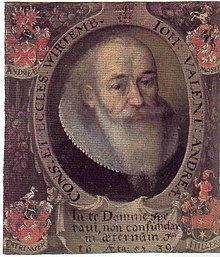Johannes Valentinus Andreae
| Johannes Valentinus Andreae | |
|---|---|

Johannes Valentinus Andreae
|
|
| Born | 17 August 1586 Herrenberg, Duchy of Württemberg |
| Died |
27 June 1654 (aged 67) Stuttgart |
| Parent(s) | Johannes Andreae (1554–1601) Maria Moser |
Johannes Valentinus Andreae (17 August 1586 – 27 June 1654), a.k.a. Johannes Valentinus Andreä or Johann Valentin Andreae, was a German theologian, who claimed to be the author of an ancient text known as the Chymische Hochzeit Christiani Rosencreutz anno 1459 (published in 1616, Strasbourg, as the Chymical Wedding of Christian Rosenkreutz). This became one of the three founding works of Rosicrucianism, which was both a legend and a fashionable semi-cult across Europe in this period.
Andreae was a prominent member of the Protestant utopian movement which began in Germany and spread across northern Europe and into Britain under the mentorship of Samuel Hartlib and John Amos Comenius. The focus of this movement was the need for education and the encouragement of sciences as the key to national prosperity. But like many vaguely-religious Renaissance movements at this time, the scientific ideas being promoted were often tinged with hermeticism, occultism and neo-Platonic concepts. The threats of heresy charges posed by rigid religious authorities (Protestant and Catholic) and a scholastic intellectual climate often forced these activists to hide behind fictional secret societies and write anonymously in support of their ideas, while claiming access to "secret ancient wisdom".
Andreae was born at Herrenberg, Württemberg, the son of Johannes Andreae (1554–1601), the superintendent of Herrenberg and later the abbot of Königsbronn. His mother Maria Moser went to Tübingen as a widow and was court apothecary 1607–1617. The young Andreae studied theology and natural sciences 1604–1606. He befriended Christoph Besold who encouraged Andreae's interest in esotericism. Ca. 1605 he wrote the first version of "The Chemical Wedding of Christian Rosekreutz". He was refused the final examination and church service, probably for attaching a pasquill (offensive, libelous note) to the chancellor Enzlin's door, on the occasion of his marriage. After that, he taught young nobles and hiked with his students through Switzerland, France, Austria and Italy. He visited Dillingen, a bastion of the Jesuits, whom he regarded as the Antichrist. In 1608 he returned to Tübingen. He came to know Tobias Hess, a Paracelsian physician with an interest in apocalyptic prophecy. From 1610 till 1612 Andreae traveled.
...
Wikipedia
